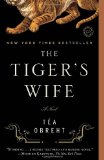Summary | Excerpt | Reviews | Beyond the Book | Read-Alikes | Genres & Themes | Author Bio

A Novel
by Téa ObrehtThis article relates to The Tiger's Wife
The Tiger's Wife comes out of the magical realism tradition. Like the technique itself, the definition of magical realism is difficult to pin down, but most critics agree that it is a literary mode that "seizes the paradox of the union of opposites." In this way, writers are able to hold, as Obreht does, the real and the fantastic together so that both paradoxical elements are accepted in the same thought.
Though the idea of magical realism was originated in 1920s Germany by Franz Roh to describe post-expressionist art, the term lo real maravillso (magical realism), as applied to literature came out of Latin America in the late 1940s. The first writers to find literary success with this mode were Argentinian Jorge Luis Borges and Colombian Gabriel Garcia Marquez, who used the technique to meld European rationality with the Native American "magical" mentality. With this technique, they attempted to develop the pure Latin American novel.
Though some critics argue that Latin American authors developed magical realism in isolation, it seems clear that this literary mode has a broader reach. Critic Angel Flores, who used the term (which some believe he coined) in his 1955 essay, "Magical Realism in Spanish American Fiction", notes that "magical realism is a continuation of the romantic realist tradition of Spanish language literature and its European counterparts." Indeed, some critics contend that the roots of magical realism lie in Kafka and Proust, rather than Borges and Marquez. The debate is complex, but there is no doubt that magical realism has become popular with writers outside of Latin America. Some critics have offered magical realism's similarity to postmodernism as a possible explanation for this broader reach. Many tenants of magical realism - eclectism, redundancy, multiplicity, discontinuity, the destabilization of the reader - are also core tenants of postmodernism.
Like postmodernism, magical realism incorporates the discourses of postcolonialism, a reaction to and analysis of colonialism's cultural legacy. According to Wendy B. Faris, author of Ordinary Enchantments: Magical Realism and the Remystification of Narrative (2004), this incorporation allows for "marginal voices, submerged traditions, and emergent literatures" to be rediscovered and integrated into narratives.
![]() This article relates to The Tiger's Wife.
It first ran in the March 24, 2011
issue of BookBrowse Recommends.
This article relates to The Tiger's Wife.
It first ran in the March 24, 2011
issue of BookBrowse Recommends.
Your guide toexceptional books
BookBrowse seeks out and recommends the best in contemporary fiction and nonfiction—books that not only engage and entertain but also deepen our understanding of ourselves and the world around us.